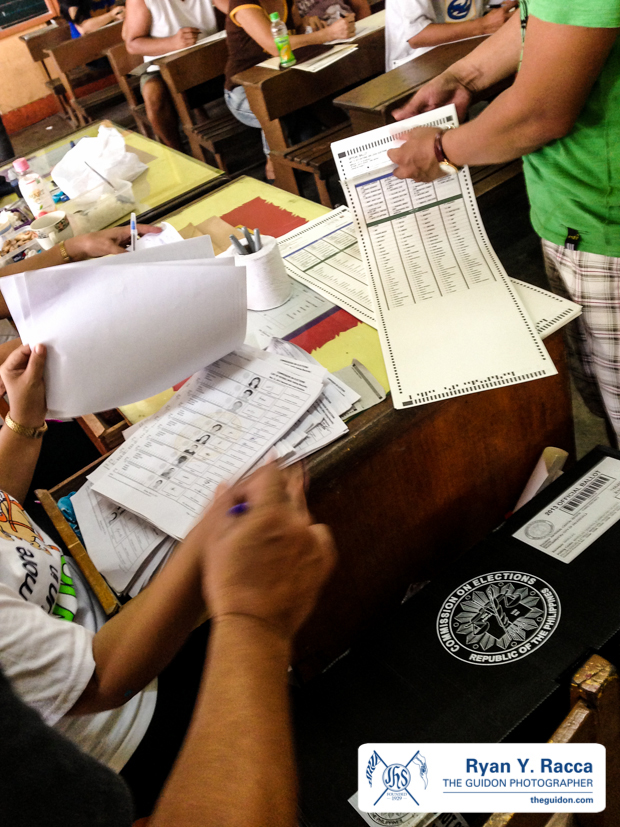FIVE DAYS after the May 13 national midterm elections, the Commission on Elections (Comelec), with results canvassed by the National Board of Canvassers (NBOC), announced the 12 new winners set to join the Philippine Senate.
Grace Poe ranked first with over 20 million votes. Following her are Loren Legarda (18 million), Alan Peter Cayetano (17 million), Chiz Escudero (17 million), Nancy Binay (16 million), Sonny Angara (15 million), Bam Aquino (15 million) and Koko Pimentel (14 million). Sonny Trillanes, Cynthia Villar, JV Ejercito and Gringo Honasan closed the lineup at over 13 million each.
Around 40 million voters participated in the elections, comprising around 75% of the total number of registered voters.
Nine of the 12 victors hail from Team PNoy, with only Binay, Ejercito and Honasan representing the United Nationalist Alliance (UNA). The Senate now has 13 senators publicly supporting the Aquino administration.
“There were talks of viewing the elections as a possible referendum on the Aquino administration,” said Atty. Jaime Hofileña, Vice President of Social Development. “I share the view that the Aquino administration came out on top in this referendum.”
Surprise, surprise
The midterm election victors were a mix of re-electionists, up-and-comers and surprise victors. However, results differed from previous public surveys.
When asked if the elections surprised him, Hofileña said, “Yes and no. No because… the senators by and large are those who are re-electionists and whose surnames are simply synonymous with the ability to become senators. But yes, surprising in the sense that the surveys did not really capture everything, specifically the emergence of Grace Poe as the number one.” Poe surprised many by beating poll-toppers Legarda and Escudero, a victory that Hofilena labeled as a “pleasant surprise.”
Political science sophomore Miko Alazas agreed that Poe’s victory was unexpected, but mentioned that he was not as surprised by the other winning candidates. “The rest of it was expected: Nancy Binay and all the other [candidates from] political dynasties winning. At the back of my mind, I was hoping for the candidates I felt strongly about—maybe [Risa] Hontiveros or [Richard] Gordon—to make it to the magic 12, but I knew it was coming,” he said.
However, Alazas added that, due to her active role in women’s rights, he had not expected Hontiveros to receive such a low ranking. Hontiveros, a favorite among Ateneans, finished 17th with almost 11 million votes.
Atenean involvement
The elections stirred up a high level of political activity in the Ateneo community. Many Ateneans volunteered for parallel counting activities for organizations such as the Parish Pastoral Council for Responsible Voting (PPCRV), while the Atenean political party Christian Union for Socialist and Democratic Advancement (Crusada) participated in political rallies.
The Ateneo Task Force 2013 also co-organized senatorial debates that helped introduce candidates to the populace. Similarly, the Ateneo School of Government also developed Ateneo FactCheck, a series of press briefs that validated and presented candidates’ credentials and stands on issues.
In addition to this, social media led to rapid news dissemination and promotion of political discourse.
“Maybe I’ve inadvertently surrounded myself with like-minded people, but even acquaintances on Facebook have been quite expressive of their political views,” says political science sophomore Marianne Vitug.
Despite these measures, Alazas lamented that a number of Ateneans still remained apathetic to the elections. “Some Ateneans have a very ‘What is going on here? This is why I don’t care,’ attitude toward Philippine politics,” he said.
Opinion gap
As results rolled in, it became apparent through social media that a significant portion of the Atenean community was displeased. School survey favorites Gordon and Hontiveros were left out of the top 12, inciting considerable negative feedback from many Ateneans.
“I largely felt that [Ateneans] were rooting for more or less the same people who had the liberal stances and therefore also shared the same disappointed feeling when the strong candidates were not elected,” Vitug said, basing her opinion on Atenean reactions to the infographics prepared by The Ateneo Assembly, as well as forums and debates held on campus.
Meanwhile, Crusada appealed to Ateneans to not only broaden awareness, but also make an effort to understand different opinions.
“Our ethnicity, socio-economic class, age, gender—all of these factors condition the way we think and act. A teenage boy who grew up in Forbes Park would think differently from a middle-aged Aeta woman,” they wrote in a Facebook post entitled “The Myth of the ‘Bobo’ Voter (The Myth of the Stupid Voter).”
“Only by seeing and treating our ‘unequals’ as equals, do we become equal. Only then will we have democracy,” the party added.
Hofileña shared the same sentiment, arguing that the results indicate what the people want. “The people have spoken and Philippine society is much larger than those that are part of the Ateneo de Manila. If certain sectors of the society are dismayed by the results, then we should all realize that this was a collective decision by around 40 million,” he said.
Lexy Senson, president of the Movement for Ignatian Initiative and Transformative Empowerment, also agreed with the sentiment, pointing out that this is something that the Ateneo community can learn from. While the results may be disappointing for Ateneans, she expressed that this is “a wake up call for all of us to do something better for our country, and not just simply be reactive.”
Election aftermath
The close of the elections called for an examination of possible implications for both the world of and outside the Ateneo. However, there also has to be an understanding that there is much to be done now. Hofileña asserted that the “real challenge for the current government is social development.”
Vitug agrees. She said that while the first half of the President’s term was marked by economic growth, she is hoping to see other tangible, inclusive changes. “All of the candidates, coalitions and parties have promised to help those at the bottom, and I’m keeping tabs on whether or not they will keep their word,” Vitug added.




